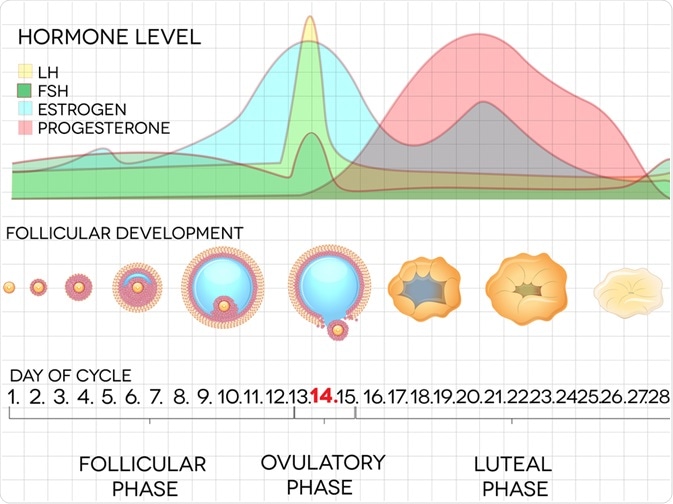Stopping Birth Control; What are the Side Effects?
Many types of birth control are act by modulating hormone levels, and there can therefore be some side effects associated with stopping these. The most common is the contraceptive pill, which has some side effects while it is being used and some that are associated with discontinuing it.

Image Credit: Africa Studio/Shutterstock.com
Use and discontinuation of birth control
Birth control such as the contraceptive pill is a safe and effective method of birth control. In the US, it is estimated that 85% of women will use the pill for an average of 5 years. While many are happy with birth control for convenience and reliability, many discontinue it at some stage of their life. Most birth controls, such as the contraceptive pill, can be discontinued at any stage, regardless of where in the cycle you are.
Stopping birth control can be due to a variety of reasons, with side effects of birth control being one of the main reasons. Other big reasons include access to the care associated with birth control and obtaining the birth control itself. However, in addition to side effects caused by birth control, there are also some side effects to discontinuing birth control.
Changes to the hormonal cycle
A contraceptive pill is a form of hormonal medication, which means that the effects of using or discontinuing it can vary greatly between users. While often used for contraception, many take the pill to help modulate PMS symptoms. Once the pill is discontinued, the undesired premenstrual symptoms such as cramps, bloating, and nausea may reappear.
Other symptoms that might return include menstrual migraines before getting their period. Where the pill would regulate cycles and control hormonal symptoms, stopping the pill can lead to side effects such as more tender breasts or more irritability.
It can also take a while for the menstrual cycle to return to normal after stopping birth control. This is highly variable between users, with some returning immediately to a normal cycle whereas others can take up to 3 months for normal periods to return.
If periods do not return for several months, the user may have post-pill amenorrhea. While on the pill, the body does not make any of the hormones involved in ovulation and menstruation. Therefore, it can take a while for the body to return to the normal production of these hormones.

Image Credit: Tefi/Shutterstock.com
Changes to fertility
The contraceptive pill is usually taken for 3 weeks, followed by one week of intermission. Because of this, there is a general preconception that birth control will limit fertility for several weeks after it is discontinued.
However, this is not the case. The hormones from the pill do not remain in the body for very long (a few days, at most) and most people will ovulate two weeks after stopping the pill. This means pregnancies can occur as little as two weeks after the pill is stopped and can happen before getting a period. Unintended pregnancy is common following discontinuation of the contraceptive pill.
There have been some concerns that the risk of miscarriage is higher if pregnancies occur immediately after stopping birth control, but these are largely unfounded because the hormones do not remain in the body for very long.
In addition to this, there is some evidence that sex drive changes when using birth control. Some users experience decreased libido while using birth control, which usually returns once the birth control is discontinued. This is theorized to be linked to natural lubrication – the pill can lead to some vaginal dryness, so stopping the birth control and returning to natural levels of lubrication can increase libido in some.
Other side effects of stopping birth control
Birth control can often help alleviate the duration and volume of menstruation. Withdrawal from the contraceptive pill is often reported to be accompanied by heavier and longer periods. Some people also experience a change in the interval between periods. This can include menstruation becoming more unpredictable, as the body adjusts to no longer having an externally controlled hormone cycle.
A commonly reported side effect of birth control is weight gain. However, the evidence for this is quite weak, with some research showing that weight gain while on the pill is limited to around one pound a year. Therefore, while many wish it was so, discontinuing the pill is not commonly associated with weight loss.
Sources
- Health Essentials from Cleveland Clinic. 2020. 6 Things That Can Happen When You Stop Taking the Pill. [online] Available at: <https://health.clevelandclinic.org/6-things-that-can-happen-when-you-stop-taking-the-pill/> [Accessed 31 August 2020].
- Westhoff, C., Heartwell, S., Edwards, S., Zieman, M., Stuart, G., Cwiak, C., Davis, A., Robilotto, T., Cushman, L. and Kalmuss, D., 2007. Oral contraceptive discontinuation: do side effects matter?. American Journal of Obstetrics and Gynecology, 196(4), pp. 412.e1-412.e7.
- Mayo Clinic. 2020. Birth Control Pill FAQ: Benefits, Risks, And Choices. [online] Available at: <https://www.mayoclinic.org/healthy-lifestyle/birth-control/in-depth/birth-control-pill/art-20045136> [Accessed 31 August 2020].
Last Updated: Sep 2, 2020

Written by
Sara Ryding
Sara is a passionate life sciences writer who specializes in zoology and ornithology. She is currently completing a Ph.D. at Deakin University in Australia which focuses on how the beaks of birds change with global warming.
Source: Read Full Article
